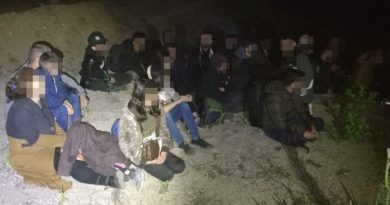The Lithuanian Ministry of the Interior submits amendments to the Law to deal with the migrant crisis on its borders with Belarus
The Ministry of the Interior (MoI), taking into account the comments of legal experts and international institutions, submits amendments to the Law on the Legal Status of Aliens (UTPĮ) to the Government. Recent amendments propose improvements to asylum procedures during emergencies. According to the Minister of the Interior Agnė Bilotaitė, this is a compromise option that allows to reconcile the interests of the country’s national security and respond to the aspects of migrants’ rights.
“When the Belarussian regime flooded Lithuania with an organized flow of illegal migrants, we faced an unprecedented emergency, so we must make decisions about the fate of thousands of people at the same time. There are no easy solutions – we must take into account international obligations regarding the rights of asylum seekers and, at the same time, not turn our country into a transitional yard for illegal migrants. In order not to live in uncertainty, decisions on the legal status of migrants must be clear and taken as soon as possible, ”says the Minister of the Interior.
In particular, the amendments propose a distinction between asylum seekers and illegal migrants, i.e. y. procedures for aliens who have not been granted asylum or who do not apply for asylum. Decisions on illegal migrants are made by the State Border Guard Service (SBGS), and for asylum seekers by the Migration Department (MD). Asylum seekers have much wider rights and guarantees than illegal migrants, who can be expelled from Lithuania immediately.
After the migration crisis in Lithuania, the UTPĮ has already been amended several times as a matter of urgency. The previous amendments set a time limit of six months for the border procedure. During this period, the person who crossed the border illegally is provided with accommodation, etc. basic services, but pending a decision on his legal status, his movement is restricted.
At the end of the six-month period of the border procedure, amendments to the law propose that the right of accommodation and movement of each migrant be decided on an individual basis:
if a migrant is granted asylum, he or she obtains a residence permit and is not subject to movement restrictions;
if the migrant is not granted asylum but appeal procedures are still pending and the migrant does not pose any risk until the decision enters into force, he or she is also not subject to movement restrictions;
if there is a risk of the migrant absconding / escaping, he or she may be accommodated by a decision of the MD or the SBGS, restricting freedom of movement to six months. The criteria for concealment are clearly set out in the current UTP;
if there are other grounds for detention established by law, such as a threat to national security or a deliberate abuse of the asylum procedure, the SBGS may apply to a court for the illegal detention of a migrant or the application of an alternative measure to detention. The courts can detain migrants for a maximum of eighteen months.
New amendments to the law also propose a faster complaints procedure. Currently, migrants can only appeal to the collegial body of the MD and the Regional Administrative Court before the decisions on refusal of asylum issued by the MD, and complaints about return, expulsion and refusal of entry are heard by two courts – the District Administrative Court (AT) and the Supreme Administrative Court of Lithuania. (LVAT). During the emergency situation, it is proposed that all the above-mentioned decisions be appealed in the pre-trial procedure – ie all appeals would be examined by the collegial bodies of the MD or SBGS and the Regional Administrative Court. This would shorten the procedures from 148 to 81 days and speed up the resolution of the alien’s legal status.
The amendments to the law also propose to establish that at the end of the six-month border procedure, all aliens would be issued an alien registration certificate. This certificate would not give the right to live in Lithuania, with it the migrant would not be able to leave Lithuania legally, but he would acquire the status of tolerance. This document would confirm the migrant’s legal status and right to work, if acquired, pending a decision on his return or expulsion. The right to work would be acquired twelve months after the date of registration of the migrant in MIGRIS.
During the emergency, it is proposed to extend the unlimited rights granted to asylum seekers. In addition, the right to receive information on one’s rights and obligations and on information relating to the processing of an asylum application, access to psychological assistance, social services and access to the Office of the United Nations High Commissioner for Refugees or other organizations providing specialized legal assistance or counseling is provided free of charge. asylum seekers. It is also proposed to determine the rights that can be exercised by foreigners illegally present in Lithuania who are not asylum seekers (for example, the right to receive information about their legal status in the Republic of Lithuania, to receive necessary medical assistance free of charge,
At present, 2607 asylum applications from illegal migrants are being processed, and around 400 illegal asylum seekers have not applied for asylum. 918 applications were processed and 1 Eritrean citizen was granted asylum.
All aliens who have crossed the Lithuanian state border illegally are considered not to be admitted to the territory of Lithuania until decisions have been made on their legal status. Most (about 80 percent) migrants crossing the Lithuanian state border from Belarus arrive without documents. This makes it difficult to make decisions about the legal status of aliens.




